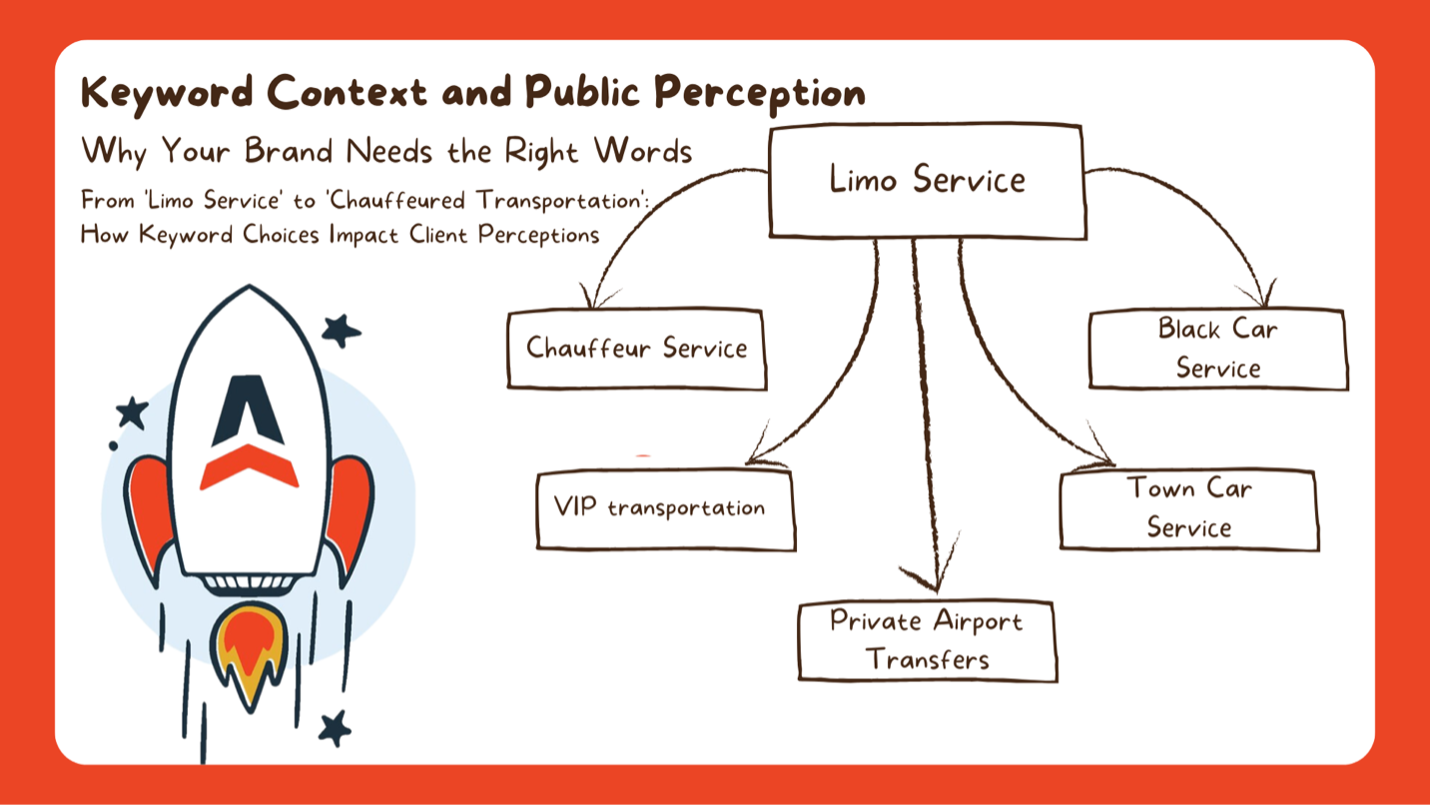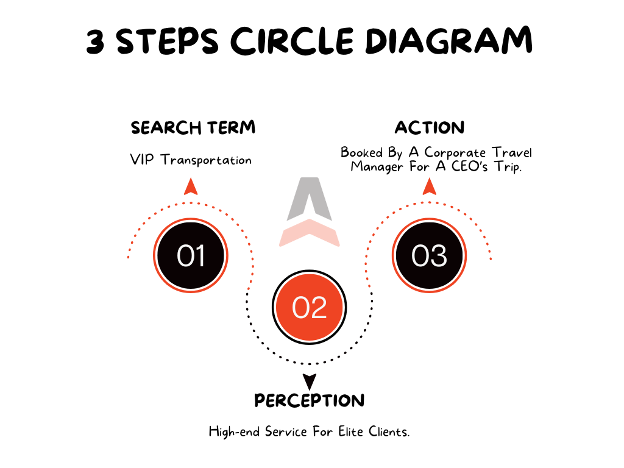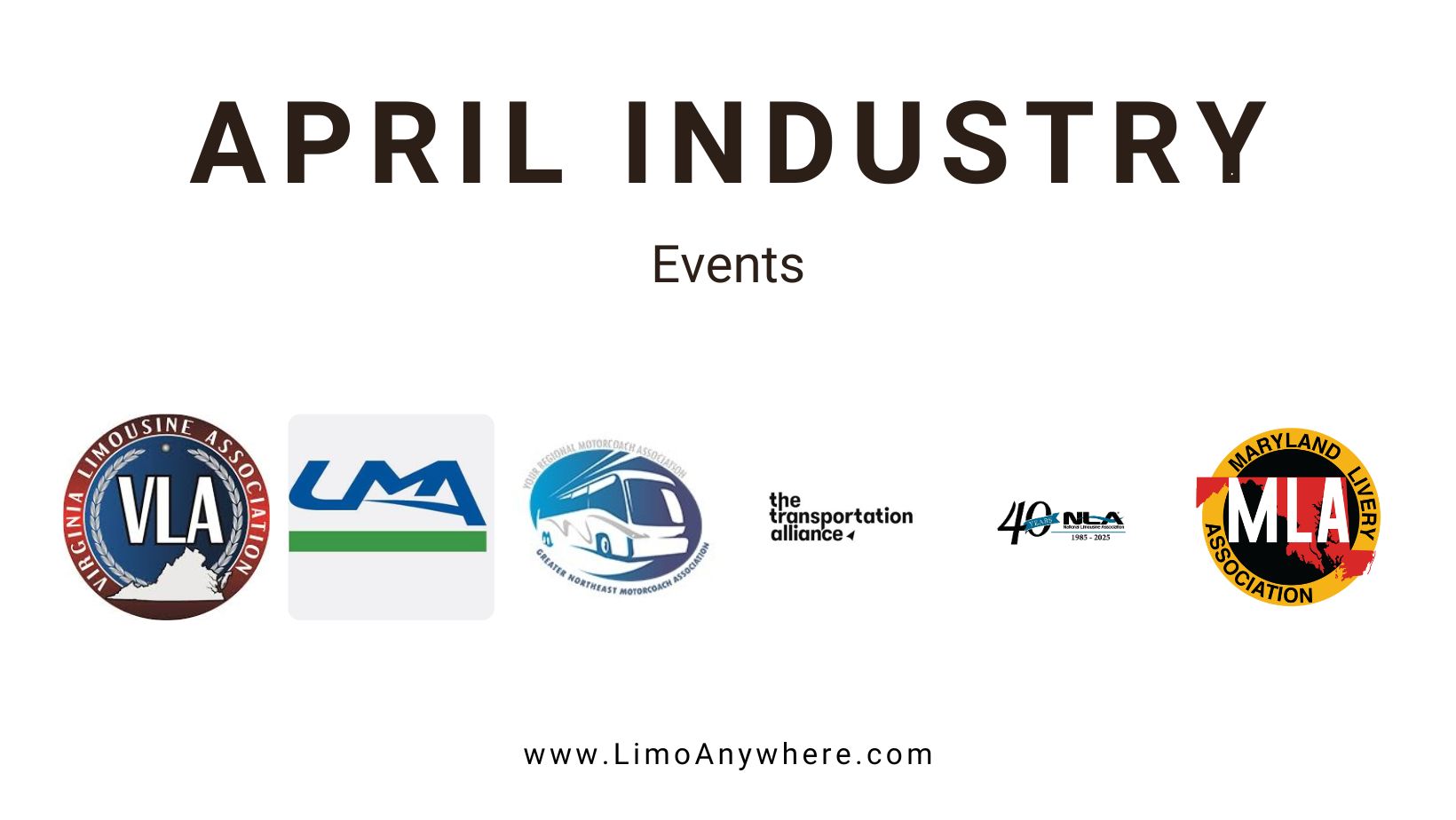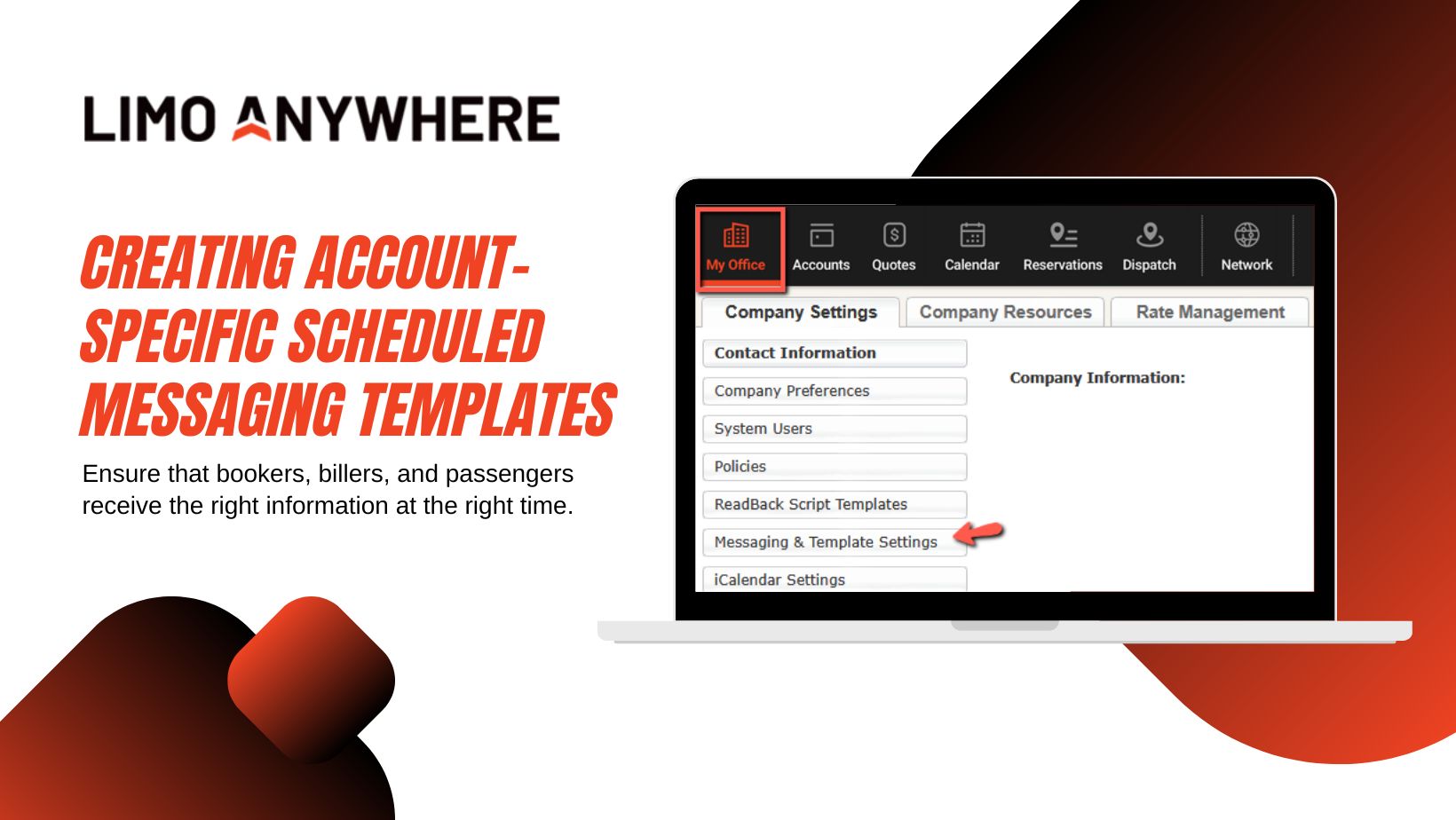From ‘Limo Service’ to ‘Chauffeured Transportation’: How Keyword Choices Impact Client Perceptions

Keyword Context and Public Perception: Why Your Brand Needs the Right Words
In the world of ground transportation, the words you choose are more than just descriptors—they’re a reflection of your brand, a connection to your target audience, and a key to higher conversions.
While SEO often focuses on search volumes, understanding the context and public perception of keywords is equally important. This blog explores why context matters, how to align keywords with user intent, and how your vocabulary shapes your overall branding.
How Public Perceptions Influence Success
Each keyword carries its own connotations. Even terms that seem interchangeable, like "limo service" and "chauffeur service," evoke different feelings in potential clients.
For instance:
- “Limo Service” often suggests luxury and special occasions like weddings or proms.
- “Chauffeur Service” conveys professionalism, exclusivity, and corporate travel.
The way the public interprets these terms directly affects their expectations of your services. By understanding these subtle differences, you can ensure your website, marketing copy, and branding align with the intent of your target audience.
Audience-Specific Vocabulary
Different audiences interpret keywords based on their needs and priorities. Here's a breakdown:
| Keyword | High Net Worth Individuals | Corporate Travelers | Event Planners & Families |
| Car Service | A discreet, luxury option tailored to personal needs. | Dependable, professional transportation for business travel. | Safe, comfortable rides for family trips or group events. |
| Shuttle Service | Rarely used; perceived as a budget or shared option. | Functional for conferences or team travel. | Perfect for weddings, conferences, or parties. |
| Chauffeur Service | Suggests exclusivity, professionalism, and high-end vehicles. | Ideal for executive transport and VIP clients. | May feel too formal or unnecessary for casual use. |
| Luxury SUV Service | Highlights space, comfort, and prestige. | Suitable for executives traveling with small groups. | Appealing to families or groups needing extra luggage space. |
Key Takeaway: Tailor your vocabulary to your audience. Using terms that don’t match their expectations can reduce trust and hurt conversions.
Why Matching Intent is Crucial
When your keywords don’t align with audience expectations, you risk losing potential clients. For example:
- Using “cheap” in a high-end market:
If you describe your service as “cheap black car service,” it might deter affluent clients who associate “cheap” with poor quality. - Using “luxury” for budget-conscious audiences:
Terms like “luxury car rental with driver” can make family travelers feel that your service is out of their price range.
Examples of Bad Keyword Use
Here are common mistakes businesses make when choosing keywords:
| Mistake | Why It’s a Problem | How to Fix It |
| Overusing “luxury” | Alienates cost-conscious clients or those looking for simple functionality. | Reserve “luxury” for high-end services; use “reliable” or “comfortable” otherwise. |
| Using “cheap” for premium clients | Undermines your brand’s exclusivity and quality. | Replace with “affordable” or “competitive pricing” for more neutral language. |
| Generic keywords (e.g., “car service”) | Too broad, making it hard to stand out in search results. | Add modifiers like “executive” or “airport” to specify intent. |
How Keywords Relate to Branding
Your keyword choices aren’t just about SEO—they’re an extension of your brand’s identity.
- Luxury Brands: Words like “exclusive,” “VIP,” and “chauffeur” reinforce the high-end experience you promise.
- Corporate Brands: Use terms like “reliable,” “dependable,” and “executive” to appeal to business clients.
- Family-Friendly Brands: Choose approachable language like “safe,” “private,” and “comfortable.”
Your keywords should flow consistently across your website, ads, social media, and even how your drivers interact with customers. A cohesive vocabulary builds trust and reinforces your message.
How Intent Flows from Keywords to Conversions
Here’s a simple visualization of how keyword context aligns with audience intent:
Search Term → Perception → Action
- Search Term: “VIP transportation”
- Perception: High-end service for elite clients.
- Action: Booked by a corporate travel manager for a CEO’s trip.

Search Term → Perception → Action
- Search Term: “Affordable airport shuttle”
- Perception: Budget-friendly option for group travel.
- Action: Booked by an event planner for a conference.
By matching the right keyword to the right audience, you increase the likelihood of converting searches into bookings.
Practical Steps to Align Keywords with User Intent
- Audit Your Website Content: Review the words you use on landing pages, blogs, and service descriptions. Do they align with your target audience?
- Test Audience Reactions: Use A/B testing to experiment with different keywords in ads or page titles. Track which terms lead to better engagement.
- Update Regularly: As audience behavior evolves, so should your keywords. What works today might not resonate next year.
Primary Industry Keywords with Context, Examples and Optimization Tips
Professional Car Service
- Context: Appeals to business travelers or anyone seeking reliable, well-presented drivers and vehicles.
- Example Search: "Professional car service in Dallas for meetings."
- Optimization Tip: Emphasize driver professionalism, vehicle cleanliness, and punctuality in your service descriptions and testimonials.
Executive Car Service
- Context: Aimed at corporate clients arranging executive-level transportation.
- Example Search: "Executive car service for Dallas airport pickups."
- Optimization Tip: Highlight privacy, discreet billing options, and advanced scheduling capabilities.
VIP Transportation
- Context: Targets clients who prioritize exclusivity and luxury, such as celebrities or high-profile individuals.
- Example Search: "VIP transportation in Dallas for red carpet events."
- Optimization Tip: Use imagery and descriptions emphasizing privacy, security, and top-tier vehicles like limousines or luxury SUVs.
Business Transportation
- Context: Appeals to businesses managing transportation for meetings, conferences, or employees.
- Example Search: "Business transportation service in Plano for corporate events."
- Optimization Tip: Position this as a reliable, recurring solution for corporate accounts with clear invoicing and 24/7 availability.
Private Airport Transfers
- Context: For travelers seeking direct, private rides to/from the airport.
- Example Search: "Private airport transfer from DFW to hotel."
- Optimization Tip: Highlight benefits like no ride-sharing, fixed rates, and convenience for families or business travelers.
Corporate Shuttle Service
- Context: Ideal for businesses arranging transport for groups, such as employees or conference attendees.
- Example Search: "Corporate shuttle service for Dallas tech event."
- Optimization Tip: Emphasize fleet capacity, reliability, and the ability to customize routes.
Group Transportation Service
- Context: For event organizers or large parties needing transportation for multiple passengers.
- Example Search: "Group transportation for wedding in Fort Worth."
- Optimization Tip: Show how your fleet can accommodate groups, and include photos of buses or vans.
Special Event Transportation
- Context: For clients seeking luxurious, dependable transport for unique occasions.
- Example Search: "Special event transportation for gala in Dallas."
- Optimization Tip: Showcase event-specific testimonials, highlight punctuality, and offer package pricing.
Point-to-Point Car Service
- Context: For customers needing quick, reliable rides without hourly commitments.
- Example Search: "Point-to-point car service to Dallas convention center."
- Optimization Tip: Describe flexibility and transparent pricing for single trips.
Hourly Car Service
- Context: Appeals to those who need transportation for a set number of hours.
- Example Search: "Hourly car service for shopping in Fort Worth."
- Optimization Tip: Emphasize flexibility, convenience, and how this service works well for tours or errands.
Long-Distance Car Service
- Context: Targets travelers seeking comfort and reliability for intercity trips.
- Example Search: "Long-distance car service from Dallas to Austin."
- Optimization Tip: Mention features like flat rates, comfortable seating, and stress-free alternatives to driving.
Chauffeured Transportation
- Context: Highlights the professional, dedicated nature of your service.
- Example Search: "Chauffeured transportation for business meetings in Plano."
- Optimization Tip: Use content to differentiate chauffeured services from rideshares or self-drive options.
Town Car Service
- Context: Appeals to those seeking a classic, reliable option, especially for business travel.
- Example Search: "Town car service for DFW pickups."
- Optimization Tip: Highlight the comfort and simplicity of town cars, perfect for professional appearances.
Sedan Service
- Context: For customers seeking non-luxury, efficient private transportation.
- Example Search: "Sedan service near Dallas airport."
- Optimization Tip: Include specific vehicle descriptions and emphasize cost-efficiency without sacrificing comfort.
Luxury SUV Service
- Context: Targets families or groups looking for upscale, spacious transport.
- Example Search: "Luxury SUV service for family travel in Dallas."
- Optimization Tip: Highlight features like luggage space, child seating options, and premium interiors.
Private Shuttle Service
- Context: Appeals to travelers or organizers who want an alternative to shared shuttles.
- Example Search: "Private shuttle service from DFW airport."
- Optimization Tip: Mention how this service avoids delays, offers direct routes, and accommodates custom schedules.
Private Driver Service
- Context: Focuses on customers seeking personalized, one-on-one attention.
- Example Search: "Private driver service for errands in Fort Worth."
- Optimization Tip: Emphasize trust, convenience, and the option to retain the same driver for repeat trips.
High-End Transportation
- Context: A broad term for luxury and premium services.
- Example Search: "High-end transportation for Dallas private events."
- Optimization Tip: Use this term in aspirational content, like event blogs, and feature premium fleet options.
Airport Chauffeur Service
- Context: Combines the luxury of a chauffeur with the functional need for airport transport.
- Example Search: "Airport chauffeur service for DFW to hotel."
- Optimization Tip: Highlight meet-and-greet options, flight tracking, and personalized assistance.
City-to-City Transportation
- Context: For customers seeking reliable rides between major urban centers.
- Example Search: "City-to-city transportation from Dallas to Houston."
- Optimization Tip: Highlight fixed pricing and premium comfort for long trips.
Choosing the right keywords is about more than optimizing for search engines—it's about creating a genuine connection with your audience. The words you use shape perceptions, establish trust, and ultimately drive conversions. By aligning your keywords with audience intent and ensuring consistency across all channels, you can build a strong brand identity that resonates with your target customers. Remember, the power of language can set your brand apart, create meaningful connections, and ultimately convert searches into loyal clients. Keep evaluating and refining your keyword strategy to ensure your brand's message stays clear, relevant, and impactful.


